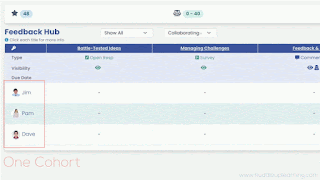Recently, our Huddle Up team has been having a debate about the cohorts we serve.
 |
| One Platform: Resources. Ideas. Feedback. Data. |
In short, does the interaction and data shared within Huddle Up's platform allow cohorts to have more productive virtual and face-to-face meetings?
We'd like to think "yes". But ultimately, time (and data!) will tell - as Project Leaders continue to find innovate use-cases.
We've created a few helpful videos to showcase the Huddle Up model. We hope they shed light on the big potential we see for how to help cohorts be more connected, engaged, and accountable to each other by focusing on ideas and feedback.
If you're looking for more specific Huddle Up resources, check out our information for Project Leaders or for Participants/Learners.
Interested in learning more about Huddle Up? Schedule a free demo.
Huddle Up Overview (40 seconds)

Comments
Post a Comment